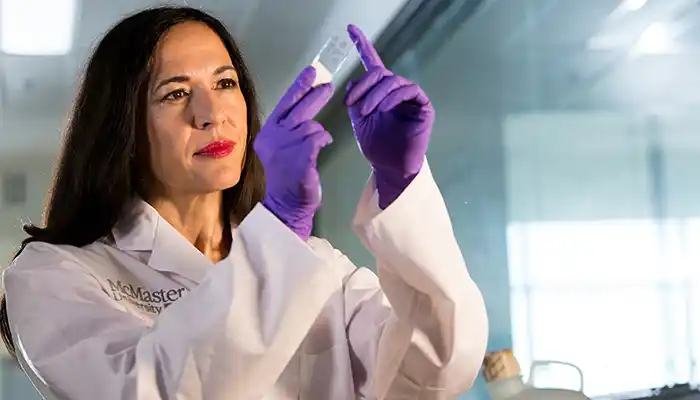Welcome to our guide on the role of a health sciences researcher and their significant contributions to driving medical breakthroughs and improving health outcomes. In this section, we will explore the key responsibilities and impact of health sciences researchers in the field of healthcare.

Key Takeaways
- A health sciences researcher plays a crucial role in advancing medical knowledge and improving health outcomes.
- They contribute to the development of new treatments, diagnostics, and prevention strategies.
- Health sciences researchers work closely with other healthcare professionals, government agencies, and research centers.
- Obtaining a degree in a health-related field and pursuing higher education is a common path to becoming a health sciences researcher.
- Opportunities in this field are expected to grow, offering a variety of career paths in government, research centers, and biotechnology companies.
What is a Health Sciences Researcher?
A health sciences researcher, also known as a health scientist or medical scientist, is a professional who focuses on conducting research in the field of health sciences. Their career revolves around studying various aspects of human health and disease to develop new treatments, diagnostics, and prevention strategies. Health sciences researchers work closely with other health professionals, government agencies, and private research centers to advance knowledge in the field and make significant contributions to improving human health.
Health sciences researchers play a crucial role in driving medical breakthroughs and improving health outcomes. Through their research efforts, they help in the development of new treatments and therapies, contribute to the understanding of the underlying causes of diseases, and identify ways to prevent and mitigate health risks.
“Health sciences researchers are the driving force behind advancements in healthcare. Their dedication to research allows us to uncover new insights and develop innovative solutions to improve human health.”
These professionals possess strong analytical and critical thinking skills, which they apply in analyzing data, designing experiments, and conducting laboratory tests on biological samples. Their expertise in research methods and statistical analysis enables them to evaluate the effectiveness of new treatments, interventions, and healthcare programs.
Collaboration and Impact
Health sciences researchers work collaboratively with other health professionals, including physicians, nurses, and allied health professionals, to translate research findings into evidence-based practice. Their work helps bridge the gap between research and clinical practice, ensuring that the latest advancements in healthcare are integrated into patient care.
By conducting rigorous research and disseminating their findings, health sciences researchers contribute to the advancement of medical knowledge and inform healthcare policy and guidelines. Their work not only benefits patients directly but also influences healthcare practices and policies on a broader scale.
Career Opportunities
A career in health sciences offers a wide range of opportunities in various settings. Health sciences researchers can work in academia, research institutions, government agencies, pharmaceutical companies, biotechnology firms, and healthcare organizations.
The demand for health sciences researchers is expected to grow due to the increasing focus on evidence-based practice and the need for continuous advancements in healthcare. This field provides the opportunity to make a meaningful impact on human health and contribute to the development of new solutions for the most pressing health challenges.
If you have a passion for scientific inquiry and a desire to improve health outcomes, a career as a health sciences researcher may be the perfect path for you.
Continue reading to learn more about the job duties of a health sciences researcher and how to pursue a career in this exciting field!
| Career | Median Salary |
|---|---|
| Medical Scientist | $88,790 per year |
| Research Scientist | $82,090 per year |
| Health Science Researcher | $76,830 per year |
Job Duties of a Health Sciences Researcher
Health sciences researchers play a crucial role in conducting research to drive advancements in the field. Their job duties involve analyzing data, conducting research, and performing laboratory tests in clinical settings. Through their expertise and research skills, they contribute to the development of new treatments, diagnostics, and prevention strategies.
One of the primary responsibilities of a health sciences researcher is to analyze data. They meticulously examine and interpret data collected from experiments and clinical studies. This data analysis helps them identify patterns, trends, and relationships, providing insights that contribute to evidence-based decision making.
In addition to data analysis, health sciences researchers design and conduct experiments. They develop research protocols, set up experiments, and gather data by performing various laboratory tests on biological samples. These tests may include analyzing blood samples, conducting genetic analysis, or evaluating the efficacy of new treatments.
Research skills are a core competency of health sciences researchers. They have a deep understanding of research methodologies and statistical analysis. These skills enable them to design rigorous experiments, ensure accuracy and reliability of results, and draw meaningful conclusions from their research findings.
Health sciences researchers often work in clinical laboratories or research centers, collaborating with other researchers and health professionals. This interdisciplinary collaboration fosters a team-based approach to research, where they collectively pool their knowledge and expertise. By working together, they can discover new insights, validate research findings, and contribute to the advancement of health sciences.
“As a health sciences researcher, conducting laboratory tests and analyzing data are integral parts of my job. Through our research efforts, we strive to uncover new knowledge that can lead to better medical interventions and ultimately improve health outcomes for patients worldwide.” – Dr. Sarah Thompson, Health Sciences Researcher
Health sciences researchers not only contribute to scientific discoveries but also contribute to the overall improvement of healthcare practices. Their findings influence clinical decision-making, treatment protocols, and public health policies, making a significant impact on patient care and well-being.
Now, let’s take a closer look at the job requirements and educational path to becoming a health sciences researcher in the next section.

How to Become a Health Sciences Researcher
To become a health sciences researcher, individuals typically follow a specific career path. It usually starts with obtaining a bachelor’s degree in a health-related field such as biology, biochemistry, or medical technology. From there, many pursue advanced degrees such as a master’s or Ph.D. in a specialized area of health sciences. Higher education provides in-depth knowledge and research skills necessary for success in this field. Additionally, health sciences researchers may undergo additional training or residency programs to gain practical experience and expand their expertise. Licensing and certification requirements vary depending on the chosen field and may be necessary for entry into the professional.
Education and Specialization
A key step in becoming a health sciences researcher is obtaining a degree in a health-related field. This provides a solid foundation in essential subjects like biology and chemistry. Depending on their interests and career goals, individuals can choose to specialize in specific areas such as genetics, immunology, or epidemiology. Specializing allows researchers to focus their studies on specific diseases, populations, or research methods, further enhancing their expertise and career prospects.
Once a bachelor’s degree is obtained, many aspiring health sciences researchers choose to pursue advanced degrees. A master’s degree provides further specialization and opens doors to higher-level research positions. A Ph.D., on the other hand, is particularly valuable for those interested in leading their research projects, directing laboratories, or pursuing academic careers.
Additional Training and Experience
While formal education is essential, additional training and experience can significantly enhance a health sciences researcher’s career prospects. Many researchers seek out opportunities to gain hands-on experience through internships, fellowships, or research assistant positions. This practical experience allows them to apply their knowledge in real-world settings and develop valuable research skills.
Residency programs are another option for researchers interested in clinical research. These programs provide a structured environment where researchers can work closely with physicians and other healthcare professionals, gaining insights into patient care and clinical research processes.
Continuing Education and Professional Development
The field of health sciences is constantly evolving, with new discoveries, technologies, and research methodologies emerging. To stay current and advance in their careers, health sciences researchers need to engage in continuing education and professional development activities. This can involve attending conferences, workshops, and seminars to learn about the latest advancements in the field. Additionally, researchers can take advantage of online courses and webinars that offer specialized training in specific research techniques or areas of interest.
Continued learning not only keeps researchers up to date with the latest developments but also demonstrates their commitment to professional growth and excellence. It allows them to expand their skill set and explore new research opportunities, ultimately enhancing their career prospects.
Career Paths and Entry into the Profession
Once the necessary education and training are completed, health sciences researchers can pursue various career paths. They can work in academic institutions, government research agencies, private research organizations, pharmaceutical companies, or healthcare settings. The choice of career path often depends on individual preferences, research interests, and employment opportunities available.
Entry into the professional field of health sciences research may require additional steps such as obtaining appropriate licensing or certification. These requirements vary depending on the specific field and the nature of the research being conducted. For example, researchers working with human subjects may need to obtain certification in human research ethics, while those working with animal models may require specialized animal care and use certifications.
Ultimately, becoming a successful health sciences researcher requires a passion for scientific inquiry, a commitment to lifelong learning, and the drive to make significant contributions to improving human health.

Conclusion
In conclusion, a career as a health sciences researcher offers an exciting opportunity to be at the forefront of medical breakthroughs and contribute to improved health outcomes. Through their research efforts, health sciences researchers play a pivotal role in developing new treatments, diagnostics, and prevention strategies that benefit individuals and communities.
The field of health sciences offers a wide range of career choices for aspiring researchers. With opportunities in government agencies, private research centers, and biotechnology companies, individuals can choose a path that aligns with their interests and goals. Not only do health sciences researchers have the chance to make a meaningful impact on human health, but they also have access to research grants and resources that support their work.
For those considering a career in health sciences research, it is important to be aware of the educational requirements and career path. Pursuing a degree in a health-related field and obtaining advanced degrees in specialized areas provides the foundation for success. Additionally, staying updated on the latest advancements and acquiring additional training can further enhance one’s expertise in the field.
By becoming a health sciences researcher, individuals can embark on a fulfilling career that combines scientific curiosity, intellectual rigor, and a passion for improving health outcomes. Through their dedication and contribution to the advancement of medical knowledge, they can shape the future of healthcare and positively impact the lives of countless individuals.
FAQ’s
What do healthcare researchers do?
Healthcare researchers work in a variety of settings, including medical laboratories, health services, and government agencies. According to the Bureau of Labor Statistics, job growth in the health science field is expected to be faster than average in the coming years. Researchers in this field may diagnose and study infectious diseases, develop new medical devices, or conduct clinical trials to improve health outcomes.
Those interested in becoming a medical scientist typically need a postsecondary degree in health or a medical degree. Careers in this field often require specialized training as a medical technologist or medical laboratory technician. The median annual wage for medical scientists is above the average salary for all occupations in the U.S.
What is the job description for health science?
Health science is a diverse field that incorporates aspects of life science to address various health needs in society. Professionals in this field work in a range of career fields such as health leadership and clinical pathology. They typically work in hospitals, offices and laboratories, and even in government and private sectors. Scientists in health science may specialize in mass manufacturing and distribution of medications or focus on treating patients in a medical setting. The duties and responsibilities of a health scientist can vary significantly depending on their area of focus.
To become successful in this field, individuals usually need to earn a ph.d or complete advanced training in related fields. They may spend their days conducting lab work, utilizing specialized lab equipment, and collaborating with other professionals to determine the best course of action for patients. The job outlook for those in health science is promising, with a wide list of occupations available for those interested in pursuing this right career. Many health scientists work full time and contribute to advancements in medical schools and research institutions.
Where do health sciences librarians work?
Health sciences librarians typically work in settings such as medical schools, hospitals, research institutes, and healthcare organizations. They play a crucial role in providing access to vital information for successful medical research and patient care. Their job may involve interaction with patients to help them find reliable sources of information. Librarians in this particular field typically have a higher education level than general librarians, as specialized knowledge in areas such as hematology is necessary. Opportunities are expected to grow in this field by 2028, with higher salaries being a potential reward for those who need to become experts and develop programs to meet the needs of their patrons.
What Does a Public Health Scientist Do?
Public Health Scientists work to protect and improve the health of communities through research, education, and initiatives. They may focus on preventing the spread of diseases, promoting healthy behaviors, or analyzing data to identify health trends. To become a health scientist, individuals typically need a background in public health, biology, or a related field. Also known as a medical scientist, they often conduct experiments in laboratories and analyze the results to inform public health policies and interventions. Additionally, they may test water and air quality, conduct surveys, or work directly with communities to address health concerns. On-the-job experience is crucial for advancing in this field.





